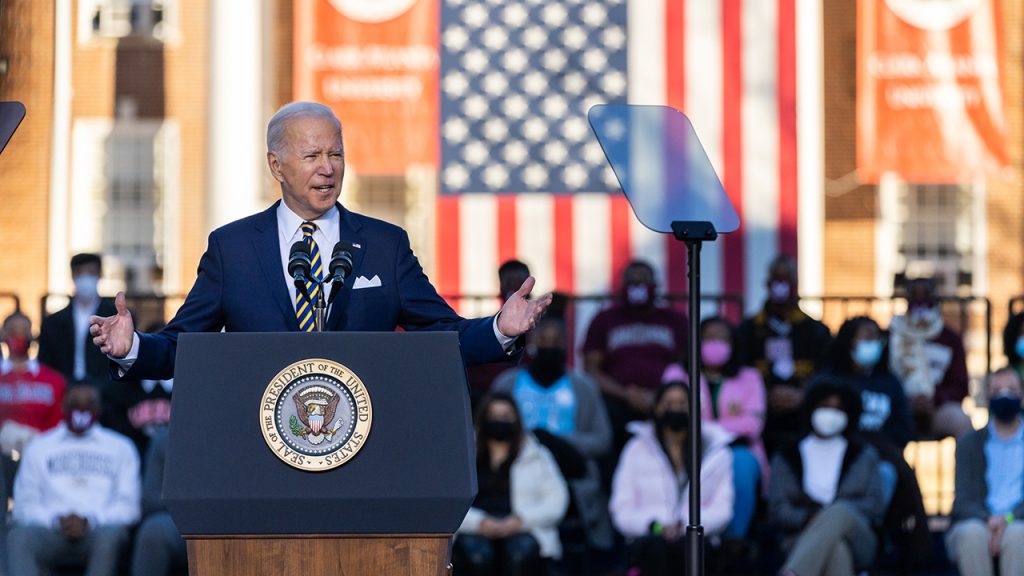MichMash: Michigan’s impact on the 2024 elections
Detroit News columnist and editor Chad Livengood talks with MichMash host Cheyna Roth on what role Michigan will play in the 2024 election.

President Biden remarks on voting rights in January 2022.
The next presidential campaign cycle is starting as President Joe Biden and former president Donald Trump have announced they’re running. Detroit News columnist and editor Chad Livengood talks with MichMash host Cheyna Roth on what role Michigan will play in the 2024 election.
In this episode:
- Voters are saying gun control and abortion rights are the main issues they’re focused on
- Dark money campaign donations are coming under scrutiny from those who established the legal framework in Michigan
- Suburban counties are seeking a new formula to fund road repairs
Subscribe to MichMash on Apple Podcasts, Spotify, NPR.org or wherever you get your podcasts.
“Michigan remains the ninth largest, most populous state in the country. And it has a pretty diverse electorate that politicians come in and want to be in front of,” Livengood says. “And we’ve seen that pretty intensely in the last two cycles, more so than we had seen in many, many years.”
Issues connected to the COVID-19 pandemic were top of mind for voters during the 2020 election cycle. As the next presidential election gears up, Livengood says the two primary issues for voters are abortion rights and gun control.
These issues have come up from state to state, but the presidential election will bring this conversation to a national stage.
“I think those two issues, abortion rights and guns, they will resonate here, particularly in suburban Detroit and suburban Grand Rapids and that could be a major factor in helping Democrats win the state and keep Joe Biden in the presidency,” Livengood says.
The Michigan Democrat and Republican Parties are taking different campaign approaches, Livengood says. While the Democrats in the state are united behind President Biden, Republicans are not operating as a “normal political party” under chair Kristina Karamo’s leadership.
“[Karamo] doesn’t have office space, she doesn’t have money, and the donor class is essentially sitting out operating the Republican Party,” Livengood says. “So the normal machinery of the Republican Party is kind of non-existent. And so what are they doing to get ready? I mean, they haven’t even actually committed to having a primary next year.”
Karamo is considering a closed republican convention or caucus where 1,000 republicans would decide who gets the Republican Party’s nomination, Livengood says.
Enlightening dark money
Livengood also recently spoke with Richard McClellan, a retired republican attorney, lobbyist and advisor of former Governor John Engler. McClellan played a large role in creating laws that allow dark money, or anonymous donations, to be given to politicians using 501(c)(4) nonprofit social welfare organizations.
McClellan says the use of dark money has gone too far and more financial disclosure is needed. Recently, the Detroit News reported a $500,000 campaign contribution to a nonprofit controlled by former Michigan Senate Leader Arlan Meekhof has turned into an investment fund. Since Meekhof left office in 2018, the West Michigan Community Preservation Fund earned $134,128 in investment income and gains and spent $125,786, according to tax documents.
“(McClellan) was reacting actually to our reporting on Arlan Meekhof and was kind of shocked by it: that the fund was gaining money, and it could be invested in a stock market, it also could be invested in something else we don’t know about,” Livengood says.
Dark money has created two campaign finance systems in Michigan and at the very least, McClellan would like to see disclosure for both types of donations.
Suburban counties are also circling back to a longstanding conversation on how road repairs are funded in the state. Michigan’s road funding formula, Act 51, was created before the interstate highways system and gives the same amount of money to repair a two lane road as it does to a six lane road, Livengood says, benefitting rural counties more.
Legislatures in MaComb, Oakland and other metro areas would like to see a change made to take into account the number of lanes they have to maintain, Livengood says. Overall, Michigan’s road repair funding needs an upgrade as gas taxes decrease and drivers transition to electric vehicles.
Related posts:
- Why state Democrats scored big in the 2022 Midterms
- Detroit Today: What Fox News’ Dominion settlement says about the media landscape
- Detroit Evening Report: Detroit police announce 12-point plan to reduce downtown crime
Support the podcasts you love.
One-of-a-kind podcasts from WDET bring you engaging conversations, news you need to know and stories you love to hear.
Keep the conversations coming. Please make a gift today.
